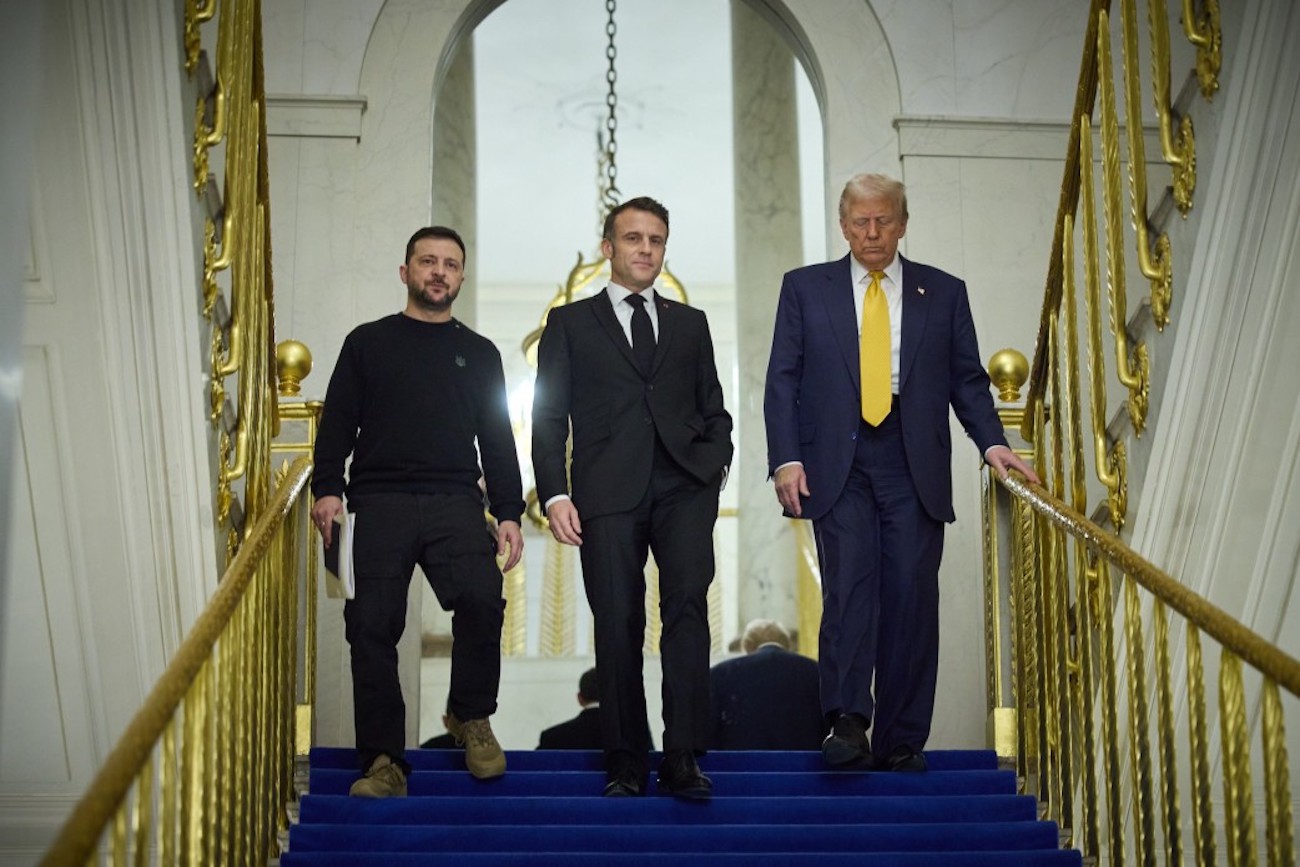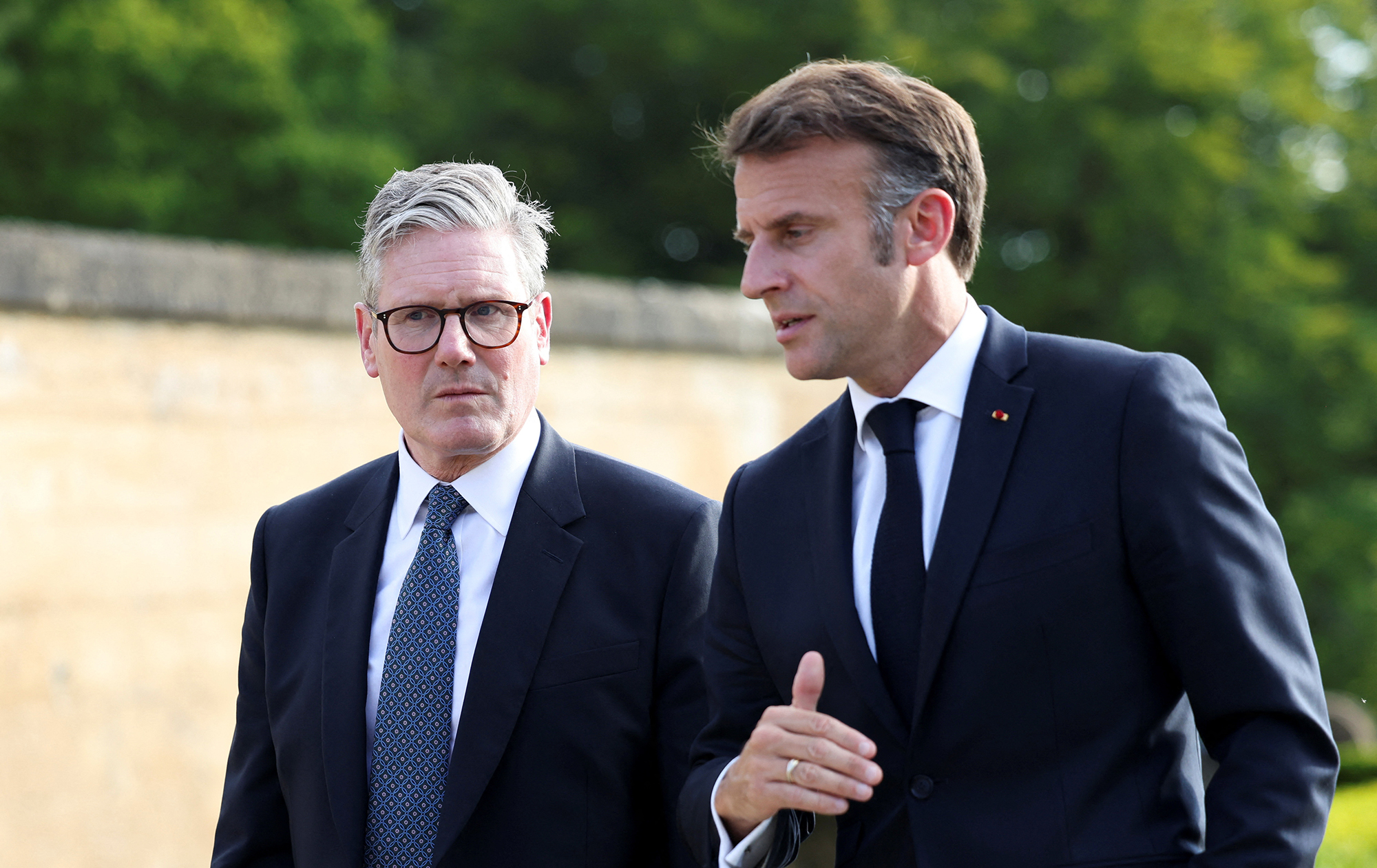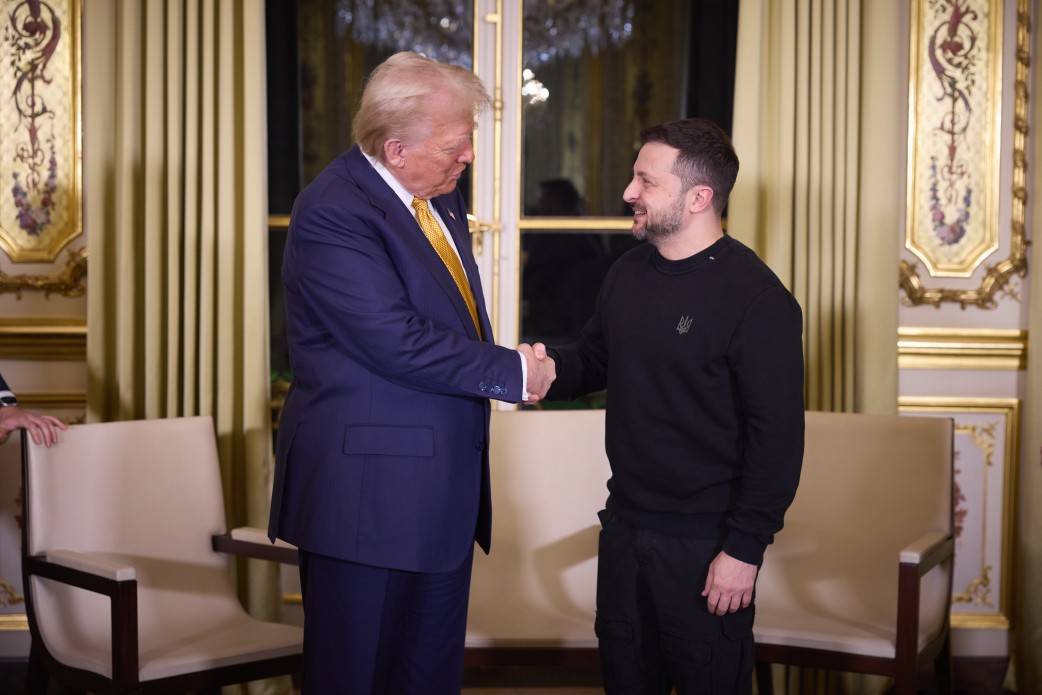Will West send troops to Ukraine to end war with Russia?
 Photo: Volodymyr Zelenskyy, Emmanuel Macron and Donald Trump discuss options for ending the war in Ukraine in Paris (Getty Images)
Photo: Volodymyr Zelenskyy, Emmanuel Macron and Donald Trump discuss options for ending the war in Ukraine in Paris (Getty Images)
The idea of deploying foreign troops in Ukraine is increasingly being discussed both within the country and among international partners. So far, there are no specific proposals or details on the composition of participants, but one thing is clear: any such mission would likely take the form of a peacekeeping operation.
What is known so far, at what stage the idea is and whether Russia will agree to the presence of foreign forces - read in the material by RBC-Ukraine.
Contents
- The idea of foreign troops in Ukraine: How it came about
- What Europe thinks about sending troops
- What Ukraine says about foreign troops
- What format might be possible, and will Russia agree
The idea of foreign troops in Ukraine: How it came about
US President-elect Donald Trump identified ending the Russia-Ukraine war as a top priority upon his inauguration on January 20, 2025 and expressed a desire to act swiftly. This was reportedly discussed at the Paris meeting with the presidents of France and Ukraine, during which Trump emphasized the urgent need for a ceasefire.
According to Reuters, three main options for ending the war are reportedly on the table. These include plans proposed by the US Special Envoy for Ukraine and Russia Keith Kellogg, elected Vice President J.D. Vance, and former acting Director of National Intelligence Richard Grenell. All of them, in one form or another, advocate for a freeze along the current line of conflict.
Read more in the material by RBC-Ukraine.

Photo: Zelenskyy, Macron, and Trump at a meeting in Paris on December 7 (president.gov.ua)
The question is what guarantees will prevent Russian troops from breaking through the conventional “new border.” One idea is to protect a 1,200-kilometer buffer zone with the involvement of European troops. "We are not sending the Americans to keep the peace in Ukraine. And we will not pay for it. Let the Polish people, Germans, British, and French do it," an unnamed member of Trump's team told The Telegraph.
The new US administration will begin by seeking to bring Moscow and Kyiv to the negotiating table, says future national security advisor Mike Waltz. Involving Europe will be a key objective, possibly including a peacekeeping component.
The idea of deploying foreign troops is not new. Back in February 2024, French President Emmanuel Macron openly discussed the possibility of NATO forces being deployed if Ukraine requested assistance. In the spring, media reported that NATO had privately established red lines that could lead to the intervention of Western troops.
Specifically, Poland, Estonia, Lithuania, and Latvia have suggested sending troops if Russia makes significant gains on the battlefield. At the time, Estonian President Alar Karis stated that Ukraine did not see a need for foreign armies. Hungary and Germany, however, have generally opposed the idea.
What Europe thinks about sending troops
Following the first reports of North Korean troops’ involvement in the war against Ukraine, Lithuania’s Foreign Minister Gabrielius Landsbergis called for revisiting Macron’s idea. "Regretfully, we are lagging again, being reactive, but I believe in our joint capacity to make all the necessary proactive steps to turn President Macron’s ideas into action,” Landsbergis said.
After Trump’s victory in the US elections, discussions indeed intensified. Le Monde, citing sources within the British military, reported that Paris and London are open to creating a joint European strike force. French Foreign Minister Jean-Yves Le Drian stated that there are no red lines and, in response to questions about French troops’ involvement in defending Ukraine, said that France does not rule out any options.
Ahead of her visit to Ukraine on December 1, the new EU foreign policy chief, Kaja Kallas, confirmed that Europe can play its role. "So far, the discussion has centered on which countries are ready to send soldiers to Ukraine and which are not. I believe that nothing can be ruled out and a certain strategic ambiguity should be maintained in this matter," she said.

Photo: French and British leaders discuss the possibility of sending a European contingent to Ukraine (Getty Images)
As Radio Liberty reports, London and Paris are discussing the format of monitoring the ceasefire in Ukraine, possibly leading to the deployment of their troops along the line of contact if Russia and Ukraine reach such a ceasefire as part of a peace process.
Germany’s Foreign Minister Annalena Baerbock stated that German troops could join such a mission, while Chancellor Olaf Scholz clarified that the Bundeswehr will not be involved in Ukraine as long as the conflict persists.
Recently, Polish Prime Minister Donald Tusk, whose country will take over the EU presidency on January 1, 2025, mentioned that peace talks could begin this winter. Today, Emmanuel Macron visited Poland to discuss the potential for a European mission.
According to Rzeczpospolita, Poland, with its geographical position and growing military capabilities, should be an important part of the plan. The media outlet also quotes former NATO Assistant Secretary General Camille Grand, who said Macron assured Trump of Europe’s readiness to join the process. Grand considers the most realistic scenario to be a Korean-style frozen conflict with a demilitarized zone.
Rzeczpospolita also cites Elie Tenenbaum from the French Institute of International Relations (IFRI), who is working on such a mission project. Tenenbaum believes it could consist of five brigades - about 40,000 soldiers. This number, she notes, is significant and should be taken into account, according to the head of the board of the Penta Center for Applied Political Studies Volodymyr Fesenko.
"Maybe 40,000 isn’t enough to deter Russia, but we’ll still have our own army. And, by the way, reducing our forces will likely be part of the negotiations. We need to maintain a strong, capable army while expecting others to reduce their forces to at least pre-war levels," Fesenko said in a comment to RBC-Ukraine.
As for the 40,000 contingent, Western countries likely have rough estimates of how many troops are needed to monitor a ceasefire along a front exceeding 1,000 km. However, the fact that Ukraine’s partners are discussing their potential readiness is a positive sign, Fesenko added.
What Ukraine says about foreign troops
The issue of foreign forces participating in the war on Ukraine’s side has periodically arisen in statements. This has particularly been linked to the deployment of North Korean troops in Russia’s Kursk region. In October, President Volodymyr Zelenskyy stated that while Ukraine would welcome help, its partners are skeptical about the idea, and Ukraine has never insisted on it.
"This cannot solely be our public will, because otherwise, it could undermine all other support, and we cannot risk losing the support we already have," he said.
Regarding peacekeepers, in November, RBC-Ukraine, citing sources within Ukraine’s top military-political leadership, reported that the idea of European forces could appear in Trump’s final plan, fully aligning with his concept that European security is the responsibility of Europeans.
However, the idea has faced a lukewarm reception within Ukraine, as the deployment of peacekeepers would effectively mean agreeing to a frozen conflict indefinitely, which is unacceptable for Kyiv. Now, however, Ukrainian leadership seems more open to discussions.
"When we talk about a frozen conflict, if it is between us, we talked about it. I said that we want the war to end more than anyone else in the world. And of course, a diplomatic end to the war will bring more lives to be saved, and we want that. But I have emphasized to both President Macron and President Trump: you will see - Putin does not want to end this war. Therefore, he must be compelled to do so," President Zelenskyy said about the Paris meeting.

Photo: Zelenskyy confirmed he discussed freezing the war with Russia with Trump (president.gov.ua)
The problem is that if a ceasefire agreement is reached, it does not eliminate the ongoing military threats to Ukraine.
"Who guarantees our security? I'll tell you frankly, we can think and work on Emmanuel's (Macron's - ed.) position. He proposed that troops of this or that country be present in some territories of Ukraine, which would guarantee us security while Ukraine is not in NATO. But we need clear guarantees regarding when Ukraine will be in the EU and NATO," he added.
Simply placing foreign troops won’t work. It would require coordination with partners, an agreement for their deployment, a separate decision by Ukraine’s Parliament, defining their mission, and even the nature of their weaponry.
Today, Deputy Prime Minister for European and Euro-Atlantic Integration and Justice Minister Olha Stefanishyna said that Ukraine is open to discussing the deployment of foreign troops on its territory. “Ukraine is ready to speak about whatever works,” she said in an interview with Politico.
What format might be possible, and will Russia agree
The deployment of foreign troops, especially peacekeeping missions, would only be feasible through an agreement on a ceasefire, explains Volodymyr Fesenko.
"I have serious doubts that Russia would agree to have these functions carried out by Ukraine’s allies. In theory, Russia could agree to a neutral option, such as UN peacekeepers or a technical mission to monitor the ceasefire, similar to the OSCE role in the Minsk agreements," he noted.
On the one hand, the experience of Minsk shows that such missions do not ensure lasting ceasefires. On the other hand, Moscow views Poland, Britain, and France as Ukraine’s allies, and if it opposes Ukraine’s NATO membership, it will also oppose NATO member troop presence.
However, this scenario shouldn’t be entirely dismissed, as there is some rational basis. Since territorial deadlock persists, security guarantees become one of Ukraine’s priorities, says Fesenko.
"If we are denied NATO membership, we have no other choice, but there must be alternatives. One option is deploying peacekeepers along the frontline. Or, even better, deploying forces from countries willing to participate. I wouldn’t see this as a peacekeeping mission, but as a long-term security guarantee," he added.
Fesenko believes Russia would oppose this, but if it insists Ukraine stays out of NATO, some guarantees are necessary. From this perspective, developments from both the French and Polish sides suggest progress toward practical security guarantees.
"I think, over time, either before or after peace talks with Russia, a coalition of determined nations in support of Ukraine will emerge. We are likely to work with this coalition on arms supplies, the potential deployment of troops, and so on," said the political analyst.
There are no specific proposals for foreign troops in Ukraine so far. Today, Polish Prime Minister Donald Tusk indicated that his country isn’t considering sending troops at this stage.
According to Reuters, there is no consensus in Europe, so the idea of creating a coalition of 5 or 8 countries capable of acting on bilateral agreements with Ukraine is being discussed. Fesenko believes more than eight countries could join.
"Either way, directly or indirectly, the coalition could include France, Poland, and the Baltic states – that’s already five countries. The UK and Nordic countries – that’s already ten. And I fully expect that after the parliamentary election, Germany could join, as well as the Netherlands, though there could be some complications there," he added.
Sources: Reuters, Politico, Le Monde, Rzeczpospolita, The Telegraph, comments by Volodymyr Fesenko, the head of the board of the Penta Center for Applied Political Studies.

